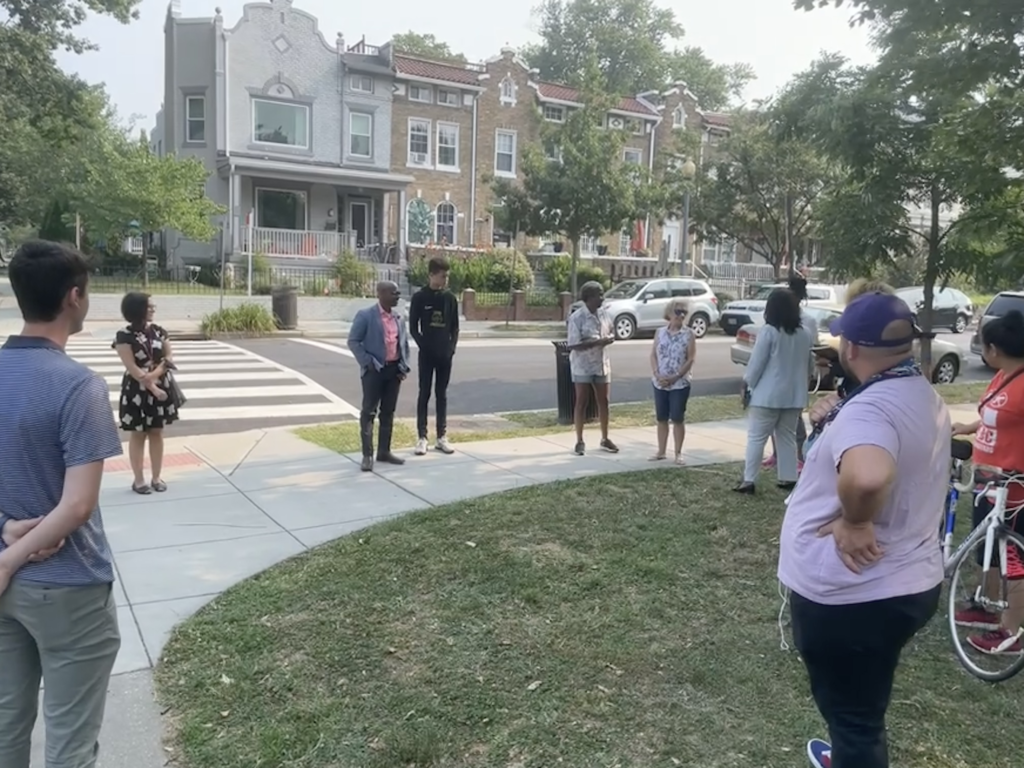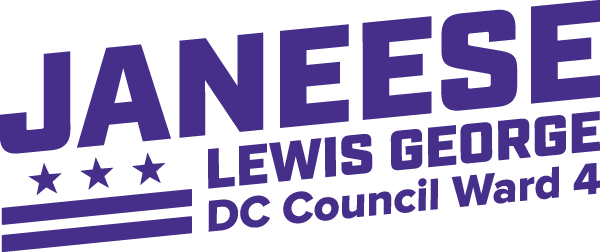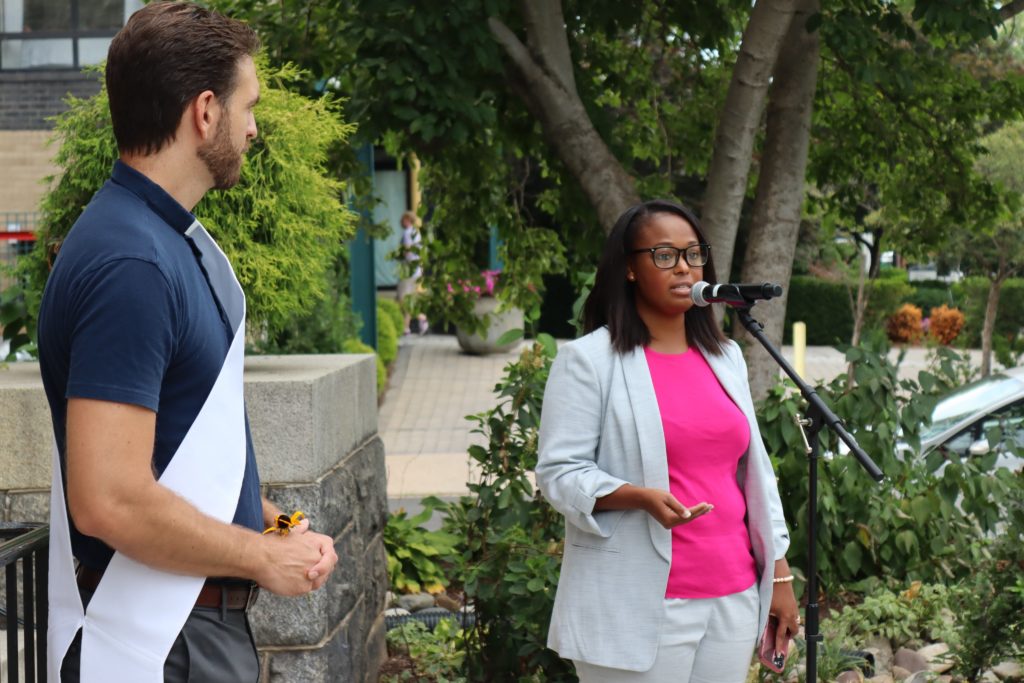| Dear Neighbors, I’m writing to update you on the latest about the DC budget, including a budget amendment that will have a huge, positive impact on our most vulnerable, most neglected, and most excluded residents. I’ll also share an update on the devastating gun violence crisis our city is experiencing. And as always, I have lots of events, resources, and community news to share. |
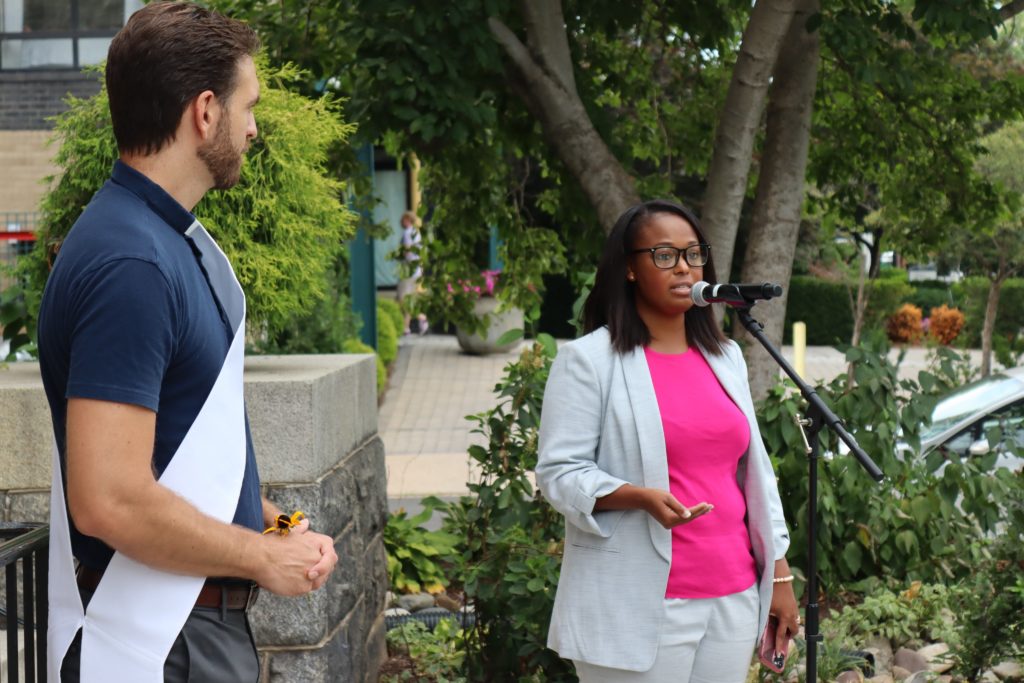
Legislative Updates
A Huge Step Towards Ending Homelessness, Funding Child Care, and Lifting Up Working Families
On March 5, 2016, city leaders gathered in a crowded Foundry Church and made a commitment to end chronic homelessness in the District. Five years later, on June 18 of this year, our unhoused neighbor Jose Antonio Navarro was found dead on the steps of that very same church. He was the 41st DC resident to die without housing this year, and there have since been at least two others. While DC has made some progress in reducing chronic homelessness for families, the number of individuals experiencing homelessness since 2016 has increased. I hear almost every day from constituents who worry about the conditions that our unhoused neighbors have to endure out on the street and in growing encampments across the city. With the eviction moratorium set to expire and federal funding to house residents in hotels running out, the situation is likely to worsen.
Jose’s loss was weighing heavily on my mind as I introduced a proposal with Councilmembers Brianne Nadeau and Charles Allen to raise income taxes on individuals making more than $250,000 a year in order to make transformative investments to end homelessness, fund child care, raise wages for early childhood educators, and provide a monthly basic income to low-income families in DC. Even before March 2020 our city was marked by stark inequality and unmet human needs. Then we had a pandemic that hit working people the hardest, especially in Black and Brown communities.
The truth is that in a city as wealthy as ours allowing chronic homelessness is a choice. Allowing poverty to continue is a choice. Paying child care workers less than they need to get by is a choice. We have the wealth and resources to solve these issues. This proposal, which passed the Council by an 8-5 vote, was about treating housing for our residents as a human right, recognizing child care as essential infrastructure, and putting money in the pockets of working families who need it most. Here’s what it means more specifically:
Ending Chronic Homelessness
Some issues are complicated but the solution to homelessness is simple: it’s housing. Every year this amendment will provide housing to 2,400 households who are experiencing homelessness or who are in desperate need of housing. This includes more than 1,267 units of Permanent Supportive Housing, which addresses chronic homelessness by providing both housing and wrap-around services for individuals and families to get back on their feet. It also includes 307 units of Targeted Affordable Housing for Families, which serves families experiencing homelessness who need less intensive case management and support services. And it funds 455 units of Local Rent Supplement Program, includes units earmarked for senior citizens, LGBTQI+ residents, returning citizens, and survivors of domestic violence. And finally, it funds more than 500 units under the Flexible Rent Subsidy Program, which provides flexible subsidies to help more families maintain affordable, dignified housing.
Funding Child Care for DC Families
We have a child care crisis in the District. On one hand child care is unbelievably expensive, and on the other hand early childhood educators are not paid nearly enough for the work that they do. As a result we only have 1 child care seat for every 3 children and families who need one – and workers are increasingly being pushed out of the profession.
Early childhood education from birth to age three makes a huge impact on a child’s life by teaching them during their most foundational moments. It’s also what empowers parents – especially moms – to return to the workforce when they have kids, and know that their children are being well cared for. Child care is the work that makes all other work possible. Child care workers are overwhelmingly Black and Brown women who barely make over the minimum wage while doing work that is absolutely essential. Most kept working in person throughout the pandemic because we depend on them. It should not be lost on anyone that low pay in early education is a relic of the racist and sexist belief that child care should be done for free or for cheap by women of color.
If we want to have quality, affordable, widely-accessible child care in DC that begins with paying childcare workers what they deserve. Pay parity is the only way we can keep the dedicated early educators we have now, recruit new educators, and bring long-term stability to an industry that DC families are counting on. By funding the landmark Birth to Three Act our amendment will raise wages significantly for child care workers and fund child care like the vital infrastructure that it is.
Monthly Basic Income for Working Families
The Amendment we passed this week also establishes the first-ever monthly basic income for the working families who need it most. By increasing DC’s local match of the Earned Income Tax Credit (EITC), households making up to $57,000 a year will receive an additional payment each month. While the exact amount each family will receive depends on their income, the average family will receive about $250 per month through this benefit. This will reduce food insecurity, allow families to spend more on their children, improve educational outcomes, and help people who are struggling in our community. As someone who was raised by a single mom within that tax bracket I know that these payments will make a big difference in helping families cover their bills and meet essential needs. Learn more about the monthly basic income in this DCist story.
Raising Taxes on Residents Making More than $250,000
I’ve heard some confusion about the tax increase in this amendment, who they will impact, and how. Here is some information that may be helpful:
- The income tax increase applies to individuals making $250,000 income, not households. In other words, if you and your partner make that amount combined, that is not enough to trigger a higher tax rate for you.
- Because of the standard deductions that reduce taxable income, such as a mortgage or charitable donations, individuals likely won’t see their taxes increase unless their gross income exceeds $300,000 (or more if you have significant deductions).
- This is a marginal income tax increase. That means that the first $250,000 you make will still be taxed at the same level. It’s only taxable income made above $250,000 that will be taxed at a slightly higher rate.
- Individuals who have slightly more than $250,000 in taxable income will only bear a small tax increase. For example, someone making $300,000 per year will only pay an additional $31 per month.
- The overwhelming majority of new revenue raised through this tax will come from residents making more than $1 million per year.
I have been moved by all of the residents I’ve heard from this past week who earn more than $250,000 per year but still support this proposal because they want to see their unhoused residents move into safe homes, have child care workers paid dignified wages, and support families in our community who live paycheck-to-paycheck. Despite a higher income tax, the District has one of the lowest tax burdens in our region due to our comparatively low property tax and auto tax. Plus DC residents like living in the District because they love their community, their neighbors, and the amenities here. Regardless of whether you were affected by this small tax increase, I hope you agree that it is an important step towards having a more equitable, more compassionate city.


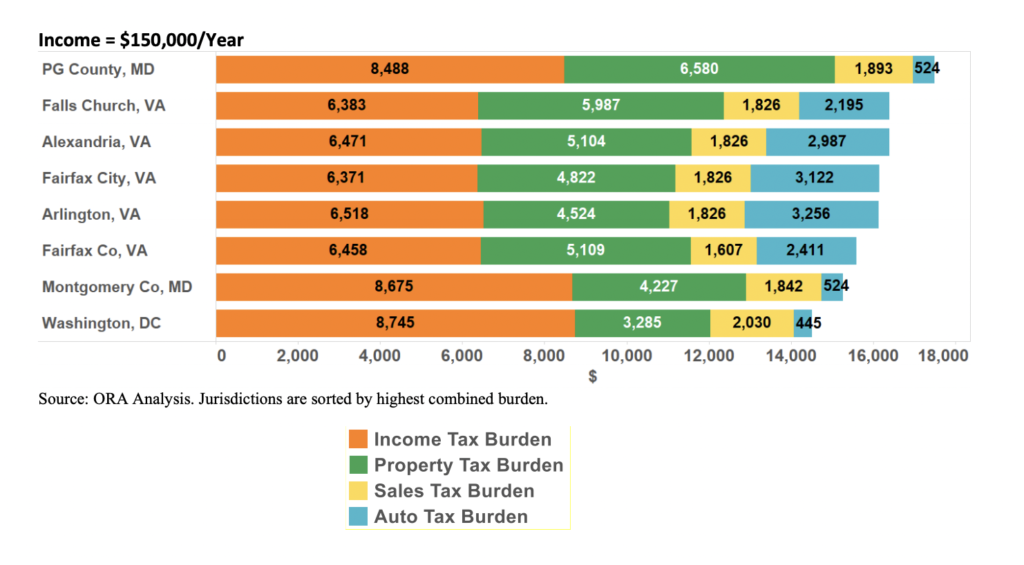
Public Safety
Responding to Gun Violence in Our Communities
Our hearts are heavy this week because of the devastating gun violence that our city is experiencing. From the shootings by Nationals Park and 14th Street to the tragic killing of 6-year-old Nyiah Courtney in Southeast DC and the public safety incidents in our own neighborhoods, it’s clear that DC has not been spared from the nationwide surge of gun violence. These crimes are senseless and catastrophic. We cannot afford for this situation to continue and for more lives to be claimed by gunfire.
Everything we do in the short term needs to be about keeping guns off our streets and everything we do in the long term needs to be about changing the conditions and systems that lead someone to shoot a gun towards their own community. Gun violence is a symptom of all the ways in which we fail our people. Education, poverty, joblessness, displacement, mental health, addiction, and more… Our laws and our budget need to change that reality – not incrementally but enough to be transformational.
Since taking office in January I have worked to improve agency focus and coordination on community safety in Ward 4. I have met with MPD Chief Contee, Deputy Mayor Geldart, and DC’s Gun Violence Prevention Director Harllee Harper several times to build on that coordination. I have also coordinated neighborhood safety meetings and neighborhood walkthroughs with related agencies to identify and act on specific issues that exacerbate crime in our neighborhoods. And in April I convened our public safety leaders for a Ward 4 Community Safety Forum for residents to learn about the city’s gun violence prevention initiatives and raise their concerns so that agencies can act on them. Meanwhile my constituent services team is constantly engaging DC government to resolve issues before they escalate, such as addressing blighted properties, repairing street lights, mediating neighborhood conflict, and providing health resources to neighbors struggling with mental health or addiction. My team and I are also planning a “Jobs Not Guns” Fair on Kennedy Street in August to provide opportunities to our neighbors at risk and help address the public safety issues that have persisted on Kennedy Street for years now.
I also communicate regularly with 4th District leadership. They call me when there is a shooting in the Ward and I respond to the scene, contact the ANC Commissioner, and speak with nearby neighbors. In response to the rise in gun violence in DC I worked with MPD to implement changes in 4th District strategy, including more on-foot patrols rather than having officers remain in parked vehicle. In addition, earlier this year I wrote to the Bureau of Alcohol, Tobacco, Firearms and Explosives (ATF) urging them to strengthen regulations against ghost guns and prioritize investigations on gun trafficking into the District. Ghost guns in particular have been really harmful to DC residents and the ATF has the authority to act. The ATF and the Department of Justice are now working to implement those regulations. I have also joined neighbors in relentlessly advocating for Ward 4 neighborhoods with a high concentration of gun violence to be included in the city’s Building Blocks Initiative, which is an intensive surge of resources focused on specific blocks in the city.
The Council has two key roles to play. The first is our budget, which is being finalized over the next three weeks. It gives us the opportunity to address root causes and provide direct support to gun violence prevention. The budget we are set to approve makes unprecedented investments in a comprehensive, people-centered approach to addressing gun violence. When I say unprecedented I truly mean it. Programs with a track record of success like Pathways, Cure the Streets, ONSE violence interruption, Roving Leaders, Restorative Justice Program, and hospital-based intervention after shootings are seeing their budgets double or triple in this budget and reflect the clear needs we have as a city. And we will not repeat the mistakes of the past by only funding programs temporarily. Lasting results require long-term commitments.
Programs like the ones listed above are incredibly important for two reasons: first, the overwhelming majority of gun violence comes from a very small number of people, usually in specific circumstances such as poverty, returning from incarceration, or unstable home environments. When we intervene in their lives through these evidence-based programs we can prevent gun violence before it happens. These programs also work because gun violence is most often targeted between people who know each other and are in conflict with one another. As we saw in some shootings in Petworth this summer, shootings are often retaliatory. These cycles of violence only end with direct interventions that address these conflicts.
The second role of the Council is oversight. During the performance and budget oversight process earlier this year I made a point to the attend the performance hearing for every public safety agency, including MPD, ONSE, DBH, DYRS, and DCRA to engage them on how to better serve Ward 4 and expand their public safety efforts. On Thursday, July 29 starting at 9:30am the Council will hold an emergency roundtable on DC’s gun violence prevention and reduction efforts. Initiatives like Building Blocks DC and the Summer Crime Prevention Initiative hold great promise, but they they have to be scaled up and the capacity has to be there now to make a difference. We also need metrics in place to evaluate how successful these programs are and make the necessary changes. Transparency and accountability are essential, especially on an issue as important as community safety.
I grew up in Ward 4 and I love our community. I have seen my peers and neighbors impacted by gun violence, and I have already witnessed far too many constituents injured or killed by gunfire. It’s what keeps me up at night. To say that the safety of our community is a priority for me is an understatement. I will continue doing everything I can to address gun violence and work with the Executive, fellow Councilmembers, Advisory Neighborhood Commissioners, and our community to keep our people safe.

Neighborhood Events
Paws on Panels Block Party! On Saturday, July 24 at 11am-2pm join Uptown Main Street, Solar Solutions, and Howard Trails Animal Rescue for a Paws on Panels Block Party at 4700 14th St NW. Activities will include free photobooth for your pet (or human family), balloon animals, bubbles, live music, concert ticket giveaways, pet-friendly outdoor cafes, opportunities to go solar, and information about pet adoption or fostering. I’ll be there with Sully and hope to see you!
Takoma Community Cleanup. On Saturday, July 24 at 9am Commissioners Erin Palmer and Evan Yeats are leading a community cleanup in Takoma. Meet them by the Takoma Metro to lend a hand! They will have some supplies but feel free to bring your own. And don’t forget to swing by a local business on your way to or from the cleanup.
Petworth Summer Saturdays Brings Jazz to Upshur Street. On Saturday, July 24 at 5pm outside of Willow (843 Upshur Street) we’ll have our third concert in the Petworth Summer Saturdays series with Vintz Desert performing. Vintz is an Indie-Folk singer songwriter in DC whose music helps people get through the rigors of life.
Chocolate City Burning Documentary Screening. On Saturday, July 24 at 8pm at the 14th Street Graffiti Museum (14th & Crittenden NW) Uptown Main Street and Washington Digital Media are hosting a film screening of Chocolate City Burning: The Untold Story of Dot-Com, a documentary chronicling one of the most prominent crews to emerge from Washington DC’s graffiti-boom of the 1990s. It’s free, but seating is limited so arrive early!
Food Giveaway on Kennedy Street. On Saturday, July 24 at 1pm there will be a food giveaway at the southeast corner of 5th and Kennedy Streets, NW. The food, which consists of non-perishable food items from USDA, will be given away on a first-come-first-serve basis. Volunteers should plan to arrive at 11am to help set up the tables. Please let your neighbors know about this food giveaway opportunity.
New Playground, Popsicle Party, Yoga, and Jazz at The Parks at Walter Reed. On Sunday, August 1 The Parks at Historic Walter Reed are hosting a full day of celebrations, including free Yoga on the Lawn by Yoga Heights at 9:30am-10:30am, a new FRESHFARM Market from 10am-2pm, a Playground Popsicle Party to celebrate the new playground at 4:30pm, and a jazz concert lineup with the popular children’s performer Baba Ras D at 5:30pm, followed at 6pm by Sam Taybron’s The Love Station and Kris Funn’s Cornerstore. Our friends at The Parks at Walter Reed have more than 90 events lined up in the coming months for residents and neighbors to enjoy. Check out the details on their website.
STAY DC Application Assistance in Petworth. On Thursday, July 29 from 12pm-7pm the STAY DC Team will be at Petworth Library (4200 Kansas Ave NW) to help residents apply for rent and utility assistance through STAY DC. Residents can cover up to 18 months of owed rent, 3 months of future rent, and all of their unpaid primary utility bills. Please let anyone who needs support with rent or utilities know so they can come by.
Summer in the Parks: Every Thursday in July at Fort Circle Park. On Thursday, July 29 from 5pm-8pm the Rock Creek Conservancy is hosting Summer in the Parks, a celebration at Fort Circle Parks in NE DC with food trucks, music, and family-friendly themed activities. Learn more on their website. Come celebrate our urban oasis!
Open Streets Returns to Georgia Avenue. On Saturday, October 2 from 10am-3pm Open Streets will return to Georgia Avenue in Wards 1 and 4. During that time period, a miles-long stretch of Georgia Avenue will close to cars and will instead host an urban festival of activities ranging from food, drinks, fitness classes, obstacle courses, children’s games, live music, and other educational and entertainment programming.
Save the Date: Down in the Reeds Festival. On Saturday, October 9 from 11am-7pm Down in the Reeds Festival is back in Ward 4 hosted by The Parks at Walter Reed! It’s a free all-day festival celebrating the power of music to heal across communities and cultures. Check out the website for ways to plug in and follow them on Facebook, Twitter, or Instagram for updates as the festival takes shape.
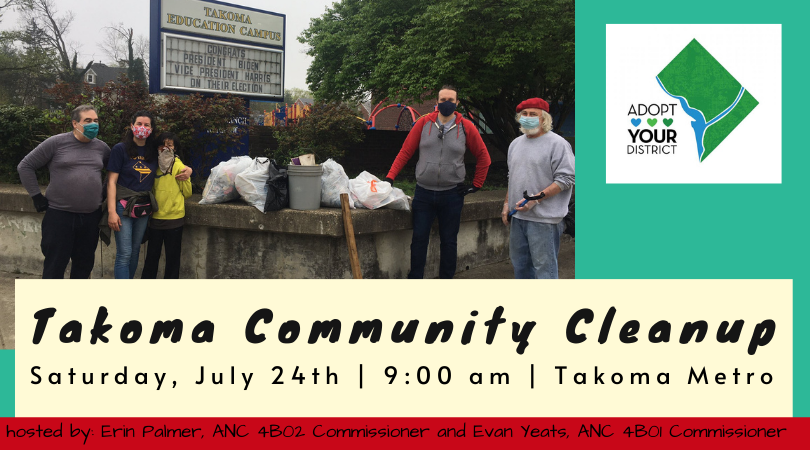
Community Resources
Parents, Don’t Miss Out on the Child Tax Credit! This week 86,000 families in DC and millions across the US started receiving a monthly benefit worth up to $300 per child under 6 or $250 per child under 18. Individuals making less than $75,000 and married couples making less than $150,000 are eligible for the full amount. Families should receive these payments the same way they received their stimulus checks, typically through direct deposit or by mail. If you did not get your stimulus, did not file taxes, or did not earn income in recent years, make sure you sign up to receive the benefit online. Undocumented parents with ITIN numbers who have US citizen children are also eligible for this benefit! And if you just had a baby, the IRS will update its portal in a few weeks so you can update your family information and enroll for checks for your baby. Also, congrats! Please do me the favor of checking in with your friends and neighbors to make sure all Ward 4 residents who are eligible for this benefit can receive it. It’s a game-changer for working families.
WMATA Extends Metrorail Hours to Midnight. Starting Sunday, July 18 you’ll be able to ride Metrorail until midnight seven days a week! The extension is the first in a set of coming improvements at Metro, including all-day rail service, high-frequency bus routes, and improved service across the region. This is particularly important for restaurant and nightlife workers and customers who rely on Metro to make it home at the end of the night. Last month Metro also resumed late-night bus service to 2am on 36 routes and restored more bus service on high-demand routes. Also on the way is a flat Metrorail fee of $2 for each weekend trip and the elimination of the transfer fee between bus and rail.
Since so much of this email has been focused on legislative updates and public safety, I’ll leave you with some hyper-local Ward 4 news.
This week I met with DDOT Director Lott, DDOT staff, Commissioner Jonah Goodman, and neighbors in Petworth to discuss much-needed traffic safety improvements to the corners of Quincy & Rock Creek Church as well as Quincy & 5th. Quincy & Rock Creek Church will get a flexipost bumpout, a curb extension, and a re-angled crosswalk. Quincy & 5th, where we had a serious accident recently, will get immediate signage and signal installation later on. DDOT will also be releasing a Notice of Intent soon to install a much-needed all-way stop sign at Illinois Ave & Taylor St. Thank you to everyone teaming up to boost traffic safety in Ward 4.
Next week I will be sharing some other excited budget updates and more community news. Have a wonderful weekend!
Yours in Community,
—Janeese
